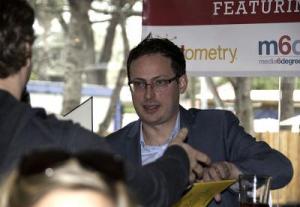WHY SCIENTISTS AND SCIENCE WRITERS AND SCIENCE BLOGGERS SHOULD BE TICKLED PINK ABOUT NATE SILVER'S MOVE FROM THE TIMES TO ESPN/ABC. There are cries of pain aplenty over mathematician/statistician Nate Silver's departure from the New York Times for ESPN/ABC, taking his enormously popular political blog FiveThirtyEight with him. But I suspect the mourners are missing the point.
Nate Silver's new gig could be a big win for the future of media in general and for science — and science writers — in particular.
Stay with me here.
Knight Science Journalism Tracker Paul Raeburn says it's not a good sign that the Times couldn't hold on to him. "I hope his television experiment works," says Tracker Phil Hilts. But Hilts doubts that TV is capable of doing serious journalism.
Yes, of course it's a big blow to the Times, and a big blow to the Times is another punch in the gut for the future of newspapers. I myself am distraught at the prospect of getting through an election without Silver at the Times. But consider what Silver has signed on to do. Yes, TV does not engender confidence in the future of journalism. But it looks to me as if television work will be only a small part of what Silver has persuaded the networks to give him (aside from what I assume is a ton of money).
They are setting him up with a fiefdom that could become a multimedia empire, but with an emphasis on articles. Text. Written prose. One that could help change journalism from the inside by infesting it with data. You know, science. It could also, not irrelevantly, employ science writers and science bloggers, maybe dozens of them. Read on.
In the beginning, before he brought readable data analysis to politics, Silver was one of the sports quants such as those canonized for bringing science to baseball in the book and movie "Moneyball." He will be returning to sports at ESPN and at FiveThirtyEight.com. At Slate, Josh Levin suggests a number of ways Silver's methods could answer important sports questions — for example, using statistics to figure out which athletes are doping. And he will be continuing the sort of political handicapping that was a major driver of traffic for the Times.
But Silver's plans go way beyond sports or even politics. "Nate Silver and ESPN to reboot FiveThirtyEight.com as a data-driven news site" is the hed on the short Nathan Olivarez-Giles post at The Verge, but the hed says it all. Here's how Silver described it in a press conference call, as told by Michael Calderone at Backstory:
“What I’ve done now with politics at FiveThirtyEight is an approach we think is applicable to lots of areas,” Silver said, adding there’s potential in business, economics, weather, health, education, technology and culture. “We’re not going to necessarily cover all those things all at once, but really more of a horizontal approach for how we do journalism and how we make data resonate for people in terms of storytelling and visuals and good journalism and everything else,” Silver said. “I think I found the perfect partner to do that given the resources that ESPN and ABC has.”
Silver has said he's got two models for the new FiveThirtyEight.com. One is already an ESPN site, Grantland, which does longer pieces on sports and pop culture, and whose czar is the high-profile sports columnist Bill Simmons. Another is one often mentioned here, Ezra Klein's Wonkblog, based at the Washington Post.
Mike the Mad Biologist considers whether, in his ambition to cover the universe, Silver is wandering too far beyond the limits of his expertise. Analyzing political polls is, Mike says, a far simpler mathematical task than crunching education and weather data — which in any case already have many analysts.
I would agree completely that he was taking on too much if Silver was proposing to tackle these far-afield topics on his own. But he isn't; the deal for FiveThirtyEight.com includes hiring a big staff. Some of these hires, presumably, will be folks who know these other fields well and can handle and analyze the data they involve. The big challenge will not be finding people who can do that. It will be finding people who can do that and who can also do what Silver does so well, which is to find the story in the data and explain it to the rest of us.
HELP WANTED AD. In her account of the press conference, Laura Hazard Owen at PaidContent reported Silver as saying something science writers and bloggers might want to note:
We’re looking for people who can think, do math and write. Those skills don’t always overlap, so it’s going to be an intense search process for us.
Silver's true journalistic strength is "narravitizing" the data, says Ezra Klein at Wonkblog, in a post that's insightful in spite of the ghastly neologism.
Silver figured out how to make data-driven election journalism into a daily product that could satisfy political obsessives. On any given day, you could head to FiveThirtyEight and get a new forecast and an engaging and clear explanation from Silver on what had changed in the forecast. Rather than covering the slow days of the election through the incremental news of the campaign trail, he covered it through the incremental changes on his spreadsheet.
IS THIS HOW THE MAJOR MEDIA ARE DOMESTICATING BLOGGING? Silver's move is part of what Jay Rosen's PressThink calls "the rise of the personal franchise site in news." Rosen names some examples and identifies key features of the personal franchise site. I have summarized his list here; the italicized comments in brackets are my own:
A star journalist at the center with a large online following and cross-platform presence. [With the exception of Kara Swisher at AllThingsD, who shares that throne with Walt Mossberg, the existing stars are all men. Is that meaningful; i.e., is the personal franchise site necessarily male territory?]
Editorial control rests with the founder and personality. [Fingers crossed.]
The site is part of a larger media company with a negotiated balance of power between the two states. Rosen quotes Josh Marshall at Talking Points Memo — an example of an independent personal franchise site — as saying these sites are how major media are domesticating blogging. “It takes some of the voice, idiosyncrasy and focus of blogging and scales it with the resources and audience numbers independents really cannot muster."
It occupies an identifiable niche or niches; there's no attempt to be comprehensive. [Silver's intention to eventually cover diverse subject matter may seem like a contradiction here, but if you say that the niche is not weather or health specifically, but rather data-driven news, he fits.]
Idiosyncratic voice, attitude and personal expression allowed. [In fact, encouraged.] The site mixes news, opinion, and analysis without categorizing each. [My journalistic roots render me uncomfortable with the idea of not distinguishing clearly between news and opinion. OTOH, that's what we bloggers do, right?]
Additional journalists are hired as the franchise succeeds, and the founder gets to hire them. [Which is why we science writers should hope passionately that this particular franchise does succeed.]
Rosen goes on to list several reasons for this trend, but here's the one I find particularly intriguing, despite his misuse of "enormity":
news executives are somewhat intimidated by the enormity of the culture shift required within legacy organizations. Instead of trying to renovate the ideology of professional newswork, a huge task that invites grandstanding, it’s easier for the editors of the Washington Post to let Ezra Klein do his (already shifted) thing and then add people to that franchise. They avoid a holy war over news vs. opinion while quietly letting the distinction corrode. Note that Klein is one of the Post’s most important political journalists but within the newsroom he is officially classified as a opinion columnist for the business section. This is a recognition that the formal structure makes no sense. The personal franchise site allows for innovation without toppling certain fictions that editors and some reporters hold dear.
WILL NATE SILVER CHANGE JOURNALISM, INCLUDING SCIENCE JOURNALISM? "There Is a 99.45% Chance That Nate Silver Is Changing Journalism" is the hed on James Poniewozik's smart post at Tuned In. Highly recommended. Poniewozik concludes
[The most important question is] how will media outlets adopt his ideas — like numeracy as a journalistic skill and the power of big data — as part of standard journalistic practice … If that’s the trend going forward, Nate Silver can win, and so can the ESPN and New York Times, and so can everyone else.
Ah, yes. Everyone else. That would include the innumerate general public. I have this fantasy that bringing what Silver does to a mass audience could make a difference with Fear of Math. Sports fans who pore over statistics and plunge into betting pools already have a sophisticated understanding of some kinds of math, although they may not realize it. Wouldn't it be wonderful if Silver & Co. could spread math literacy more widely? What a triumph, and what a boon for science writing, if they just improved public understanding of probability.
Are Silver's plans ambitious almost beyond belief? Exceptionally high risk? Of course. I am myself nervous not only about the logistical challenges, daunting enough, but about the chain of command. Silver's fiefdom will be nominally part of ESPN and ABC. His ultimate bosses, however, will be the jolly folks at their parent corporate giant. That would be the Walt Disney Company. A mixed blessing at best.
But what if it works? Even partly? Huge.




.png)

